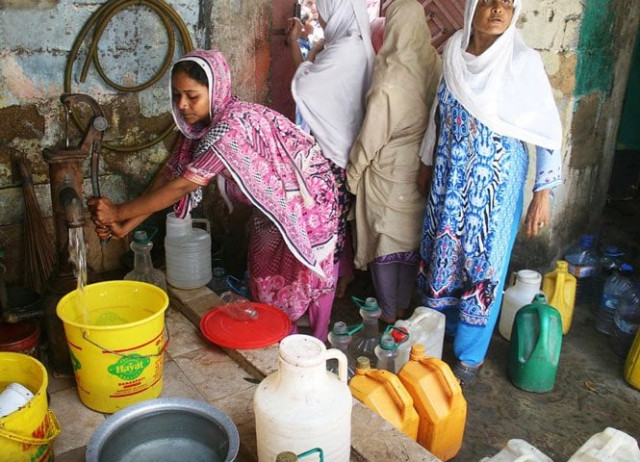Funding crunch delays K-IV project
As federal and Sindh govts fail to prioritize completion of mega water project, Karachi's water crisis worsens

For years, the K-IV project has been viewed as a lifeline for Karachi's residents suffering from chronic water shortages. Yet it appears that the financial and administrative hurdles plaguing the completion of the project are here to stay for another four to five years.
Originally launched in 2016 under the Sindh government and Karachi Water and Sewerage Corporation (KWSC) with an initial PC-1 cost of Rs25 billion, the K-IV project aimed to supply 260 million gallons per day (MGD) to Karachi within two years. However, due to severe mismanagement and design flaws, the project was halted in 2018 after achieving only 20 per cent progress. In 2021, the federal government transferred control of the project to the Water and Power Development Authority (WAPDA), which redesigned it, inflating the project cost to Rs126 billion.
Construction resumed in 2022, with a revised completion target of December 2025. A WAPDA official, speaking on the condition of anonymity, confirmed that over 63 percent of the project has been completed, however, due to rising construction material costs, an additional Rs30 billion is required.
"A revised PC-1 has been submitted to the federal government for approval, but the project has reportedly been downgraded from the government's priority list. Against the remaining Rs40 billion requirement, only Rs3.5 billion has been allocated in the current budget, causing work stoppages on two filtration plants and a major pipeline section, while other components are progressing at a sluggish pace," confirmed the official.
Efforts to obtain official comments from WAPDA General Manager (South) and K-IV Project Director Aamir Mughal remained unsuccessful, as repeated attempts to contact his office yielded no response. Reportedly, the core component of the K-IV project involves laying an underground pipeline from Keenjhar Lake to Karachi's Kathore area, supervised by WAPDA. However, three additional critical projects tied to K-IV remain the Sindh government's responsibility.
The first project concerns the augmentation plan. This project, financed through a 260 million US dollars World Bank loan, involves laying approximately 100 kilometers of bulk distribution pipelines within Karachi and connecting them to existing pumping stations. Similarly, the power supply project involves installing a 132-kilovolt transmission line from Jhimpir grid station to the K-IV pumping complex near Keenjhar Lake to provide 50 megawatts power, with an estimated cost of Rs16 billion.
Lastly, the KB feeder canal lining project, spanning 38 miles, aims to rehabilitate and widen the canal from the Indus river to Keenjhar lake, to ensure full quota delivery. A senior KWSC official anonymously confirmed that while official schedules promised completion of these three projects within two years, actual timelines were expected to stretch much longer due to bureaucratic hurdles, utility shifting delays, and complex technical requirements.
Repeated efforts to reach Sindh's Secretary Irrigation, Zareef Khero, for comments remained unanswered, while the concerned Executive Engineer cited his recent appointment as an excuse for his inability to comment at this stage.
According to a survey conducted by the Express Tribune, Karachi's daily water requirement stands at 1,200 million gallons, while the city currently receives only 650 million gallons from the Indus River and Hub Dam, leaving a staggering shortfall of 550 million gallons per day.
The survey also revealed that the KWSC officials, in alleged collusion with the tanker mafia and illegal groundwater extraction networks, have created an artificial water crisis in several areas, including Clifton, Defence, Gulshan-e-Iqbal (13D-2, 13D-3), North Nazimabad, Nazimabad, Liaquatabad, and PECHS.
Despite the critical importance of the K-IV water project to Karachi's future water security, bureaucratic inefficiencies, lack of political will, and severe underfunding continue to jeopardize its timely completion.






















COMMENTS
Comments are moderated and generally will be posted if they are on-topic and not abusive.
For more information, please see our Comments FAQ